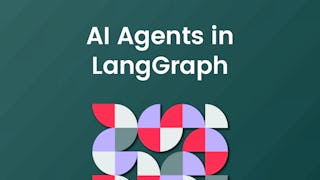Ready to build intelligent AI agents that can reason, improve, and collaborate? This hands-on course gives you the skills to build agentic AI systems using LangChain and LangGraph in just 3 weeks.

Enjoy unlimited growth with a year of Coursera Plus for $199 (regularly $399). Save now.

Agentic AI with LangChain and LangGraph
This course is part of multiple programs.



Instructors: Faranak Heidari
11,533 already enrolled
Included with
(59 reviews)
Recommended experience
What you'll learn
Build agentic AI systems using LangChain and LangGraph to support memory, iteration, and conditional logic
Design and implement self-improving agents using Reflection, Reflexion, and ReAct architectures
Apply agent orchestration techniques to build collaborative multi-agent systems
Implement agentic RAG systems that route queries and support retrieval-enhanced reasoning
Skills you'll gain
Details to know

Add to your LinkedIn profile
July 2025
11 assignments
See how employees at top companies are mastering in-demand skills

Build your subject-matter expertise
- Learn new concepts from industry experts
- Gain a foundational understanding of a subject or tool
- Develop job-relevant skills with hands-on projects
- Earn a shareable career certificate

There are 3 modules in this course
This module introduces LangGraph for building intelligent, stateful AI agents that support memory, iteration, and conditional logic. You’ll explore how nodes, edges, and shared state enable dynamic workflows, and how LangGraph extends LangChain for advanced control. Through foundational concepts and hands-on practice, you’ll learn to design, build, and execute workflows that reflect real-world agentic behavior
What's included
6 videos2 readings4 assignments1 app item5 plugins
This module focuses on building self-improving AI agents using LangGraph. You’ll explore and implement Reflection, Reflexion, and ReAct agent architectures to design workflows that evaluate and refine their own outputs. Through guided labs, you’ll gain hands-on experience creating agents that reason, integrate feedback, and improve performance using structured approaches grounded in reflection and prompt engineering.
What's included
5 videos1 reading4 assignments3 app items2 plugins
This module focuses on designing and implementing multi-agent systems using LangGraph. You’ll explore how specialized agents can collaborate to solve complex problems through structured orchestration. Key topics include core principles of multi-agent systems, collaboration patterns, and governance considerations. Through hands-on practice, you’ll build a multi-agent RAG system that dynamically routes queries to relevant data sources, gaining practical experience in coordinating specialized agents to enhance retrieval and reasoning.
What's included
4 videos3 readings3 assignments1 app item3 plugins
Earn a career certificate
Add this credential to your LinkedIn profile, resume, or CV. Share it on social media and in your performance review.
Offered by
Explore more from Software Development
 Status: Free Trial
Status: Free Trial Status: Free
Status: FreeDeepLearning.AI
 Status: Free Trial
Status: Free Trial Status: Free Trial
Status: Free Trial
Why people choose Coursera for their career




Learner reviews
59 reviews
- 5 stars
83.05%
- 4 stars
10.16%
- 3 stars
1.69%
- 2 stars
3.38%
- 1 star
1.69%
Showing 3 of 59
Reviewed on Aug 21, 2025
Great overview and the insight into the coding aspects was invaluable!
Reviewed on Nov 1, 2025
Good, Make it a little more clear on teaching the code and specific functions for agentic systems

Open new doors with Coursera Plus
Unlimited access to 10,000+ world-class courses, hands-on projects, and job-ready certificate programs - all included in your subscription
Advance your career with an online degree
Earn a degree from world-class universities - 100% online
Join over 3,400 global companies that choose Coursera for Business
Upskill your employees to excel in the digital economy
Frequently asked questions
Skills in agentic AI development are highly valuable for roles such as Software Developer, Data Scientist, Machine Learning Engineer, AI Engineer, and Automation Specialist. These positions involve building intelligent systems that use language models to reason, interact with tools, and automate complex workflows. These capabilities are increasingly in demand across industries where adaptive, language-driven automation is transforming how work gets done.
No prior machine learning (ML) experience is required. If you're comfortable with Python, you're ready to go. This course focuses on building practical agentic AI systems that reflect, improve, and act. No complex ML understanding is required.
Traditional development builds static applications, and prompt engineering fine-tunes LLM responses. But agentic AI development focuses on designing autonomous, stateful systems that can evaluate their outputs, manage memory, and interact intelligently over time. You'll learn how to architect systems that think, adapt, and collaborate, using tools such as LangGraph to build workflows with cycles, conditionals, and inter-agent communication.
More questions
Financial aid available,



